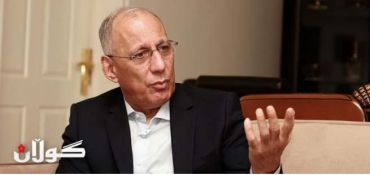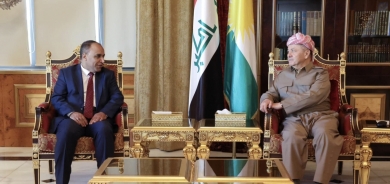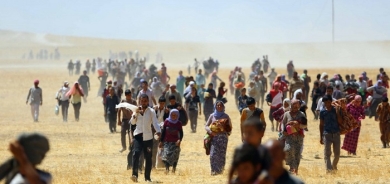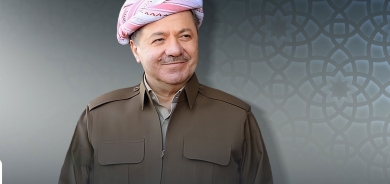Adnan Mufti, former Speaker of Kurdistan parliament to Gulan: in Kurdistan Region's constitution the system of government is parliamentary and there must be a referendum on the constitution.
May 30, 2013
Exclusive Interviews

Adnan Mufti, former Speaker of Kurdistan parliament and a senior leader of the Patriotic Union of Kurdistan (PUK).An Interview with Adnan Mufti, former Speaker of Kurdistan parliament
Adnan Mufti, former Speaker of Kurdistan parliament to Gulan: in Kurdistan Region's constitution the system of government is parliamentary and there must be a referendum on the constitution.
The issue of conducting a referendum on the constitution is about to be taken out on its legal framework and put forcefully under a political one. The project of the constitution has been approved by the overwhelming majority of the MP's and then it has been signed by Kurdistan Region's president. Then, what remains is to be put to a referendum so that the people of Kurdistan freely vote for or against it. In this respect, Adnan Mufti who was the Speaker of Parliament at the time of approval of the project and he himself gave it to the president of Kurdistan, stressed in an exclusive interview with Gulan magazine that the committee of drafting the constitution consisted of representatives of all parties, ethnic groups and religions in Kurdistan and all of them voted for it. Hence, legally it goes through all its stages and it should put to a referendum. Though political parties have their own views about it, they should arrive at a political consensus and above all they should discuss the project outside parliament and then as a supplement of the project be given to parliament so as to be put on the parliament's agenda and if it is approved by the overwhelming majority of MPs, then it can be accepted. This indicates that the constitution has no legal obstacles and since there is not a political consensus on it, the only solution is to put to a referendum. Here is the interview with Adnan Mufti, former Speaker of Kurdistan parliament and a senior leader of the Patriotic Union of Kurdistan (PUK).
Gulan: we are pleased to have this interview with you. As a former speaker of Kurdistan Parliament, how were the mechanisms of drafting the project of constitution in Kurdistan Region?
Mufti: I would like to start from the point that thinking about preparing a project of having a constitution for Kurdistan Region went back earlier, before uprising and holding the first election in 1992. Since then there had been an idea of Kurdistan having its own constitution among political parties. Yet, after the uprising and the first parliamentary election, this issue had come up again seriously for discussion, many articles had been written on it and a kind of a project had been introduced, but because of internal conflicts and fratricidal war (Brakuji), the project was delayed. Then, in 2001-2002 when parliament could hold a session with the presence of all its members, the issue raised again—I think it was on late 2002—after that the representatives of 36 parties held a meeting—they had the project in their hands—they discussed the project and also they prepared it again. They introduced the project to the parliament's first round under the name of Kurdistan Region's Constitution, but because of the situation at the time: the Iraq war, and the fall of former regime in 2003, all of these things made the project delayed until after 2005 elections.
After 2005 elections and in the second round of the parliament, the issue of drafting a constitution raised again, discussed again, and then a committee was appointed to prepare a project. I think the committee were 19 people, the members were from all different parties in the parliament-- KDP, PUK, Kurdistan Islamic Union, Islamic Group in Kurdistan, Kurdistan Communist party, Turkmen representatives, Assyrian and Chaldean representatives, and Yazidis. However, many legal experts and jurists were members in that committee. Moreover, four members who are experts about constitution and law had been elected outside parliament and they elected a chairman among themselves. Having the previous project in their hands, they started working. They prepared a project after a year of continuous discussions and debate. This project was a preliminary one, it was discussed in the media, and the people of Kurdistan and its political parties were asked to give their opinions and introduce their notes and suggestions to the committee.
During four to five months, 5000 letters and notes for amending this preliminary project that had been circulated had come to us. The committee of following up the constitution which consisted of 19 members had been working for several months on the notes and letters and they made minor committees within the same committee so as to classify the notes and summarize the opinions and then to be added to the constitution. Thus, they made many amendments in the project and they prepared it again before the end of the round of parliament. What remained were some points which were related to the political stances that should have been consulted among KDP, PUK, Kurdistan Islamic Union, and Islamic Group in Kurdistan so as to reach an approach. This was also done. Of course, in this case there were some people who did not accept the project, but because the overwhelming majority of MPs accepted the project, parliament put it to the vote in a session. This was under the act that had been passed previously for this project in the parliament—this act was signed by Kurdistan President for treatment with the project of the constitution—this means the stages of voting on the constitution in the parliament, then sending it to the president and putting it to a referendum. In this process, a session was dedicated in the parliament for voting, five to six of MPs did not come to the session because of the political reasons, and four to five MPs were abroad, and so only 96 MPs were present. 96 members voted for the project except one who voted against it. Then it was sent to the president. He signed it and sent it back to put to a referendum.
Gulan: you have mentioned that there were representatives of all political parties in the committee of drafting the constitution, and it is obvious that the political parties have different attitudes. In your opinion, how far were these different attitudes put into the constitution by the experts and lawmakers?
Mufti: yes, of course there were different views and attitudes from Islamists to Communists; from Turkmen to Assyrian and Chaldean and Yazidis. In this constitution, the rights of all these different sects and groups and individuals of Kurdistan were taken into account. If you look at the Preamble of the constitution, you see the main principles which are all big achievements and important for the citizens. However, the first article of this constitution states "the Iraqi Kurdistan is a region within the Federal State of Iraq. It is a democratic republic within a parliamentary political system that is based on political pluralism, the principle of separation of powers, and the peaceful transfer of power through direct, general, and periodic elections that use a secret ballot." This is the first article of the constitution which is very important for the future of our region.
Gulan: Now you have read the first article of the constitution that is clearly stated that the system of government is parliamentary. Yet, now and then, we have heard some from the media and political parties saying that the system of government according to this constitution is not a parliamentary one. What do you say on this issue?
Mufti: the system of government in Kurdistan is parliamentary, but the election of president is direct by the people, not by the parliament. This point is interpreted by some people as making the system presidential since president is elected directly by people. I think this interpretation is at odds with the articles in the constitution. It is not only at odds with the first article—which clearly mentions that the system of government in Kurdistan Region is parliamentary, republic, and democratic. However, the authorities of Kurdistan Region's president are very obvious, if we look at the constitution, we see that these authorities are linked to the authorities of parliament such as announcing emergency and moving Peshmarga forces outside the Region. Thus, if we take a closer look at the constitution, we see that by having this constitution, the authorities of the President are limited. Since we do not have a constitution now, the president can move Peshmarga forces outside the Region, but if we have the constitution, he cannot. Now, parliament cannot object because we do not have the constitution. So, if we have the constitution, the president cannot move the forces without parliament's agreement, he cannot allow the federal forces to enter the Region, he cannot announce emergency, and even he cannot dissolve parliament. So, if we look at the articles, the authorities of president are many, but five to six articles can be summarized in a one. I know all the authorities; all of them need parliament's agreement except a few of them.
Gulan: According to the law No. 16 of Kurdistan parliament in 2009, the referendum on the constitution should have been held on 25 July 2009. Why do you think this did not happen?
Mufti: this is an important question that is asked by many. When the project of the constitution was accepted in the parliament, we had asked the High Electoral Committee to put the constitution to a referendum along with both presidential and parliamentary elections. Yet, the media—central government's media—criticized the date as they said there were some articles in the constitution that were against the Iraqi constitution especially in an article that explained the Kurdistan Region's border; it is stated in two ways: the first one mentioned that Kurdistan's border include disputed territories. The second one related it to the implementation of the article 140 of the Iraqi constitution. They had said in the media that this was at odds with the Iraqi constitution, yet officially we had not received anything. I think there was some pressure by the Americans as they wanted the elections to be without any problem. Above all, the High Committee officially told us that the period was not enough—about a month—for the referendum, so they rejected the time and as a result the parliament decided to delay the referendum to a more suitable time with the help and cooperation of the government.
Gulan: in the process of voting on the constitution in the parliament, how many MPs did not vote for the constitution and why?
Mufti: in the voting session of the constitution in the parliament, some MPs boycotted the voting and they did not attend the session. The change movement had recently separated from the PUK. So, they had their political stance in this round of parliament. They thought that the parliament's time was over and the voting could not be done. But, we had extended the time of parliament by a law which was also approved by the federal court. Some of MPs were abroad. So, 97 MPs attended the session. Only Dr. Nuri Talabani did not vote for it. He was himself a member of drafting the constitution. But he disagreed with the other members from the very beginning because he had his own project. He could not come to an agreement with the committee of drafting the constitution. So he did not attend the committee's meetings. The other parties including Islamists, Turkmen, Christians, and Yazidis voted for it because the constitution gives the rights of all them in detail and there was not any disagreement. The only thing that arouses dispute is whether the system of the government is parliamentary or presidential. Is the election of the president direct by the people or indirect by the parliament? These disputes are very normal. I was with the indirect election of the president in the discussions held in the parliament at the time.
Let us not forget the fact that the issue of electing president by people is prior to the project of the constitution. We have a law under the name of Region's Presidential Law which is passed in 2005 before forming the committee of following up the constitution; it is mentioned in this law that the region's president is elected by the people except in this round as he was elected in the parliament. This means that the majority of both KDP and PUK agreed that the president will be elected directly by the people. The law was approved in 2005 and many times amended, its summery added to the project of the constitution.
Gulan: there is also another excuse by some people saying that at the time of approving the constitution, the parliament's time was over, and this is one of the things they are using to criticize the parliament's authority. As you were the speaker of the parliament at the time, do you think that it was not possible to pass the constitution?
Mufti: certainly not. Because according to the rules of procedure of parliament—and also in all other parliaments in the world—there is a clause stating that if the project of country's budget is under discussion and not finished, parliament should not suspend its round. That is, even if the round of the parliament finishes, the discussion cannot be delayed for the next round. For example, on fourth of June 2009, the project of Kurdistan's budget was under discussion in the parliament, so the period of the duration of parliament was prolonged. However, there is something called convention, which means experience, history. It means how you dealt with a situation like that in history. Kurdistan experienced a difficult time after the year 1992, so the period of the duration of parliament was prolonged for three times. Even at a time of the civil war, a tent was held between Massif-Salahaddin and Erbil and the required numbers of MPs were prepared and the duration was prolonged.
After several months, the period was prolonged further just to legitimate parliament. I think it was in 2001 that for another time the duration was prolonged. Thus, we have both conventions and rules of procedures. Both of them allow us to prolong the duration. Moreover, we had not prolonged the period just for the constitution. There was also the discussion of the budget under way. We found it necessary to pass the constitution and not to be delayed for the next round because its entire works were completed. For this, some filed law suit in the Federal court and objected to it, but the federal court answered by saying that because the discussion of the budget was under way, so it was legitimate and by gaining legitimacy, it could pass the laws, too.
Gulan: some experts on constitutional law say according to the standard principles, the project of the constitution is like the law. When parliament passes a law, it should be implemented, but implementing constitution as it is mentioned in the constitutional law, hinges upon conducting a referendum. How important is referendum for the constitution?
Mufti: it is true that the project of constitution is passed in the parliament as a law and it is signed by president to be put to a referendum. But if there is a consensus about returning it to parliament, a way may be found. Since there is no consensus about returning it to parliament, only people can decide in a referendum to return it to parliament. So if there is a consensus outside parliament about amending the constitution as long as it contains some shortcomings, a project can be given to parliament for amending it.
Amending constitutions are very common in the world. All the countries amended their constitution several times. For instance, if we put the constitution to referendum in 2009 and accepted, all the things that are now demanding could be normal. So, if we feel that people need to change it, we have to take it into account. But there are some people who refuse it without reading it. Although we published one million copy of it and distributed among people, I am certain that the majority of people have not read the constitution but have their opinion about it. This case should be taken into account. So, it can be discussed outside parliament so as to know the disputed points and make a consensus about it. If not, a referendum can solve the problem.
Gulan: the strategic agreement between KDP and PUK brought about stability and peace in Kurdistan. How important now is this agreement for Kurdistan?
Mufti: the strategic agreement was signed in 2005. The agreement has some objectives: it is done to eradicate and soothe the aftermath of the civil war, to merge two administrations, to deal with the new Iraq. After the fall of the former regime, when we started drafting Iraqi constitution, we had to be united in order to assert our rights in the constitution. Looking realistically to the agreement, one can say that it helps us a lot for normalizing the situation and unifying the Kurdistan Regional Government. Unfortunately, both the administrations do not merge completely. The agreement helped make Mam Jalal the president of Iraq and Massoud Barzani the president of Kurdistan Region. However, this does not mean that the agreement will last forever because life and democracy need something new. If the situation normalizes completely and we have a civil society, we will not need such an agreement. But because we are still living under the shadow of the civil war, and the wounds are not cured completely, the agreement has to be continuous, but it needs to be amended and enriched with our past experiences. For example, since the situation is normalized, PUK decides to participate in the coming elections alone. This is at odds with the agreement, but it is OK as this is the reality on the ground. Moreover, there are some who think that if we do not participate alone in the elections, democracy will become at risk. Still there are some issues in Baghdad and also things related to our neighbors that need consensus on the part of all the parties not only PUK and KDP. The important thing is that all have to know that this agreement will not be against any one. So, it is necessary for all of us to cooperate. In my view, after the elections, it is better to have a coalitional government with the participation of all the parties in order to tackle corruption in all aspects, to bring about reform, and to cultivate the spirit of love instead of hatred so as to serve our people together. It is seen that the situation in Kurdistan will step towards a new stage and a bright future will not come unless all parties work together and have a unified political agenda. If we do not do that, we may regret the consequences later on.















